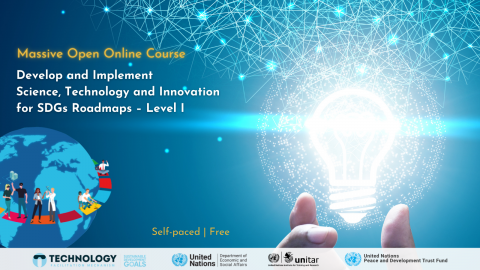
UNITAR Online Catalogue
Develop and Implement Science, Technology and Innovation for SDGs Roadmaps – Level I

Acelerar la Aplicación de los ODS
Antecedentes
This self-paced Massive Open Online course (MOOC) has been developed by the Division of Sustainable Development Goals of the United Nations Department of Economic and Social Affairs (UN DESA/DSDG) and the United Nations Institute for Training and Research (UNITAR). Following the adoption of the 2030 Agenda for Sustainable Development and the Sustainable Development Goals (SDGs) in 2015, the UN Technology Facilitation Mechanism (TFM) has been launched and created with the Addis Ababa Action Agenda (AAAA). By the commitment to implement AAAA, the Member States agreed to “adopt science, technology and in-novation strategies as integral elements of our national sustainable development strategies” (paragraph 119).
To support the Member States, UNDESA/DSDG, has developed Guidebook and Operational Note on Implementing Science, Technology, and Innovation (STI) for SDGs Roadmaps at the Country Level. The purpose of the Operational Note published in December 2020 is to provide simple introductory and practical materials on STI4SDGs Roadmaps. It helps to operationalize the Guidebook of STI for SDG Roadmaps developed by the United Nations Inter-agency Task Team on Science, Technology and Innovation for the SDGs (IATT) by enabling its systematic use through stronger capacities of countries and stakeholders to apply tools and processes.
This e-learning course has been developed based on this Operational Note and aims to strengthen capacities of key national stakeholders in this area and help mobilize the global community to assist in that endeavor. It provides key concepts, reviewing the objectives, the roles of various stakeholders and proposing a step-by-step guidance on how to develop a STI for SDGs Roadmap with some early lessons from the pilot countries. These are knowledge and skills that stakeholders need to strengthen to be able to effectively support the STI for SDG Roadmaps roll-out at the country level. The course will be linked to the 2030 Connect of the Technology Facilitation Mechanism.
The project is funded by the UN Peace and Development Trust Fund.
Objetivos del evento
This e-learning course has been developed based on this Operational Note and aims to strengthen capacities of various stakeholders at the country level to develop and implement national STI for SDGs Roadmaps by strengthening the capacities of key national stakeholders in this area and help mobilize the global community to assist in that endeavor.
Objetivos del aprendizaje
It is expected that, by the end of the course, participants will be better positioned to:
- Explain what STI for SDGs Roadmaps is and its importance in the national and global agendas;
- Describe the scope and purpose of the various levels of roadmaps;
- List and explain the six steps in the STI for SDGs Roadmaps development process;
- Discuss the methodologies available for the STI for SDGs Roadmaps and what kind of support is needed;
- Distinguish the role of government and donors in the process.
Contenido y estructura
Introduction
It provides an overview of the course and learning objectives.
Roadmaps
This section introduces the fictional country Southlands and as well as starts the journey of discovering what is STI for SDGs Roadmaps and how different countries are approaching their development.
Process
In this section, a learned will deep dive into the methodology and process of developing and implementing the STI for SDGs Roadmaps, including the needed core inputs, whom to consult and involve and, the six steps that a country would need in this process.
Roles
There are different roles for the key actors involved in the process. This section provides more detailed information on the role of government and recommendations from G-20 countries, and action plan levels.
Support
International community could support the countries in different ways. This section introduces different available methodologies, pilot programme experiences, and real life examples. It provides also a proposed joint template on development of STI Roadmaps for the SDGs.
Summary
This last section provides a short summary of the course.
Metodología
This e-learning course is developed in English and is based on the Guidebook and the Operational Note on Implementing Science, Technology, and Innovation (STI) for SDG Roadmaps at the Country Level. The course is developed around the overall learning objectives and implemented in an interactive manner. The learner will be introduced to a fictional country called Southlands that is working on developing the STI for SDGs Roadmaps. Through this country’s journey, a learner will discover the key concepts and overall methodology for developing and implementing the Roadmap. A few examples of real countries who have developed STI for SDGs Roadmaps will be presented. The course is complemented with a set of practice quizzes (“knowledge checks”/formative assessment) and followed by the final quiz to assess the knowledge and skills acquired (summative assessments). The latter will be graded and will serve as basis for certification.
Estimated net study time is around 3 hours depending on the individual’s pace.
Público objetivo
The target audience of this e-learning course is all key stakeholders involved in the development and implementation of national and local STI for SDGs Roadmaps, with a particular focus on the central agency or ministry in charge of national development plans, Ministry of Science and Technology or other agencies in charge of STI plans; or line ministries and/or a specialized agency or taskforce with the specific mandate to develop SDG plans.